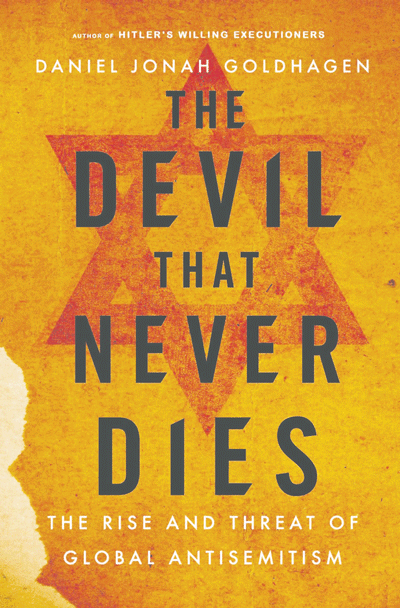The Devil That Never Dies, by Daniel Jonah Goldhagen, Little, Brown, 485 pages, $30
Reviewed by NEAL GENDLER
In his massive The Devil That Never Dies: The Rise and Threat of Global Antisemitism, Daniel Goldhagen provides both an historical survey of anti-Semitism and a frightening exposition of how it has become a global phenomenon and “an integral and accepted feature of our time.”
Simply put, “anti-Semitism is prejudice against or hatred of Jews,” says Goldhagen, author of Hitler’s Willing Executioners: Ordinary Germans and the Holocaust. He tells how anti-Semitism, until recently publicly taboo in the postwar West, has spread across the planet at the same time it has been renounced formally by its historic source, the Catholic Church.
Anti-Semitism, the world’s most enduring prejudice, “is truly global in the sense that it is available to everyone and anyone anywhere, and can easily be appropriated… for virtually any purpose,” left or right. “The one global prejudice” lives in nations with few or no Jews, among people who know nothing true about Jews, people who never met a Jew.
“Arab and Islamic anti-Semitism is the juggernaut” in today’s scourge, spread by high-volume repetition and the endless global multipliers of the Internet and social media, appropriating and combining with traditional European and white supremacist slanders.

As a Goldhagen-style adjectival string might say: The depth, breadth, intensity, relentlessness, volume and eliminationist nature of Arab and Muslim anti-Semitism makes the prospect of peace for Israel appear very unlikely.
Secretary of State John Kerry should read this book; his quest, like that of those before, appears almost hopelessly naïve.
In his forceful style, Goldhagen says that Islam’s foundational documents — the Quran and Hadith — powerfully demonize and dehumanize Jews, calling them apes and pigs; he supplies quotations.
“Anyone who claims that the antipathy of the region, or of the world at large, is only for Israel because of its policies, and not towards Jews in general because of [what he calls] their ‘Jewness,’ or who claims that such people’s intent is anything but eliminationist towards Israel the country and towards Jews… is being duped or seeking to dupe others.”
Devil is the latest book grappling with Jew-hatred, and judging by Goldhagen’s deep, detailed analysis, it aims to be definitive. Starting with Jew-hatred’s 2,000-year-deep roots — when Christians considered Jews agents of the devil — he outlines the hatred’s phases, including its public suppression from 1945 to the collapse of the Soviet empire.
Various surveys show Goldhagen that several hundred million people have negative views of Jews — depths varying greatly but many going all the way to eliminationist, a logical destination for those who believe that Jews are fundamentally evil.
Doubtless, some will dismiss Goldhagen as unduly alarmist, but his data and observations are alarming. (Doubts? See www.jewwatch.com. The notorious Protocols forgery is a smartphone app.) He shows grotesquely vile cartoons available worldwide.
American Jews who think he’s exaggerating may not realize that anti-Semitism here is less than half of Europe’s (and the arrival of Al-Jazeera TV is worrisome). He calls anti-Semitism a political ideology, and “like all political ideologies, [it] has become a program for righting the world.”
Concurrently, anti-Semites have raised Israel to become “one of our times’ central problems,” and “the drumbeat of anti-Semitic defamation of Israel and its people circles the globe and is incessant.”
Goldhagen has a lot to say and, both virtue and fault, says it in enormous detail. An exhaustive — and exhausting — education about the depth, pervasiveness, uniqueness, and increase of Jew-hatred and how it shapes discourse and attitudes toward Israel, its length betrays need for stronger self-discipline and firmer editing. Some sentences, grammatically correct, are so long they’re like German; I had to reread their beginnings to remember the subject. The first that caused me to count ran 102 words. Others were near or beyond 100 — one of them 135 — and a summary with semicolons near the end hit 254.
But Devil is bursting with information and insight. Maybe the best quote is about how Israel, as an acceptable camouflage for anti-Semitism, has transformed the once malevolent Jew: “reconstituted yet again, this time with the dominant image of a machine-gun wielding killer. Shylock… has morphed into Rambo.”
***
Neal Gendler is a Minneapolis writer and editor.
(American Jewish World, 8.30.13)



















Comments 0